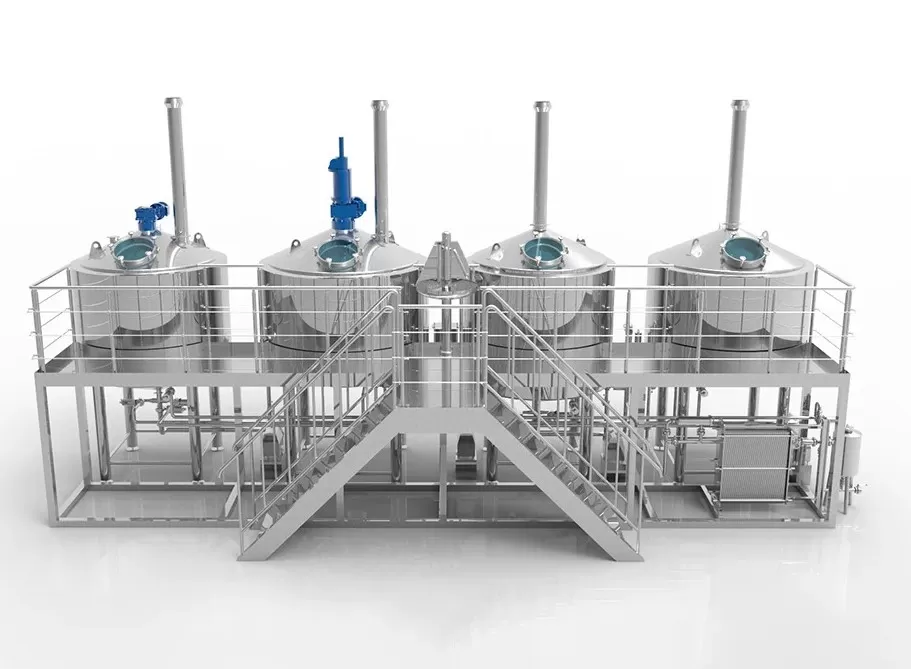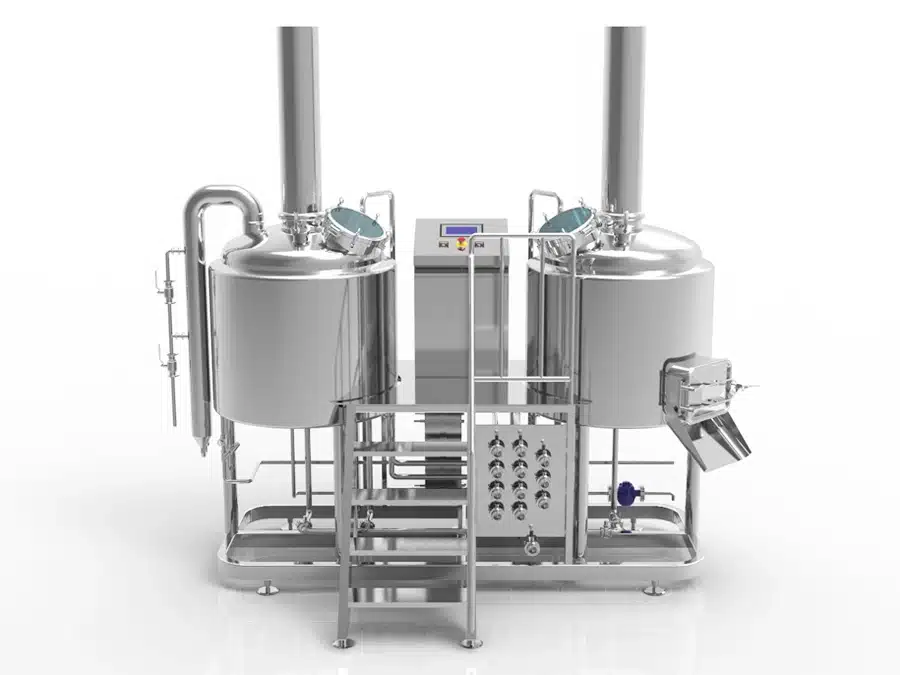Struggling with inconsistent batches, contamination risks, or equipment that just doesn’t last? Inferior tanques de mezcla can lead to wasted ingredients, production delays, and ultimately, a compromised final product, hurting your brand and bottom line. Imagine achieving perfect homogeneity every time with durable, sanitario depósitos built specifically for your needs.
Stainless steel mixing tanks are essential for quality mixing and storage because they offer superior durability, excellent corrosion resistance, and are inherently sanitario, preventing contamination. Their non-reactive surface ensures product purity, crucial in industries like food and beverage, pharmaceuticaly chemical processing. High-quality stainless steel mixing provides reliability and longevity, safeguarding your production process and ensuring consistent product quality in every depósito.
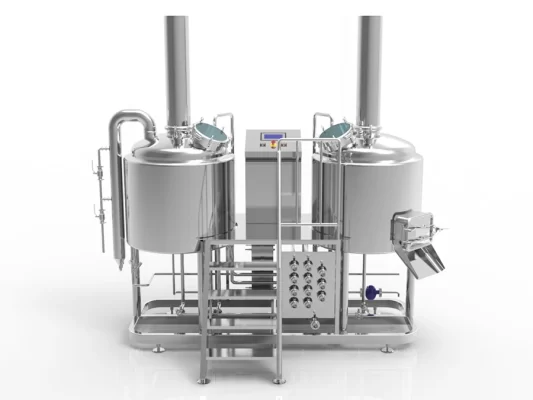
Como Brewing Equipment Manufacturing plant, we’ve seen firsthand how the right depósito transforms production. We work daily with passionate creators: Startup Craft Brewery Owners carefully crafting their first batches, Experienced Brewmasters demanding precision, Brewpub & Restaurant Chains ensuring consistency across locations, and innovative Beverage Entrepreneurs venturing into kombucha or even high-quality distillery equipment. They all share a common need: reliable, alta calidady customizable solutions. It’s not just about a depósito; it’s about the heart of their operation. This critical piece of processing equipment is where magic happens – ingredients combine, flavors meld, and quality takes shape within the depósito.
Choosing the perfect tanque de mezcla can feel overwhelming. You’re looking at different grades of stainless steel, maybe a jacket para control de temperatura, various agitador designs, specific gallon capacities, and countless custom features. It’s a big decision! This guide is here to help. We’ll dive deep into the world of tanques de mezcla de acero inoxidable, sharing insights from our years of experience crafting these essential depósitos for clients ranging from wineries and cider producers to large-scale food processing facilities. We understand that you need more than just a depósito; you need a dependable partner offering robust soporte técnico. Let’s explore why stainless steel is the champion material and how you can select the ideal tanque de mezcla for your unique mixing and storage tank applications. This exploration covers everything from simple depósitos de almacenamiento to complex, jacketed tanques de mezcla.
What Makes Stainless Steel the Gold Standard for Mixing Tanks?
Why stainless steel? It’s a question we hear often, and the answer is clear: it’s simply the best material for the job in most demanding applications. Grades like acero inoxidable 304 y 316l stainless steel are the workhorses of the industria, especially for tanques de mezcla. The number one reason? Incredible corrosion resistance. Stainless steel has a secret weapon: chromium. This element forms a thin, invisible, and self-healing layer on the surface. Think of it like a protective shield for your depósito. This shield stops rust and prevents the metal from reacting with whatever you put inside – whether it’s acidic beer, delicate pharmaceutical compounds, or ingredients for food processing. This non-reactivity is absolutely vital. It means your product stays pure, without picking up unwanted metallic tastes or contaminants from the depósito itself.
But it’s not just about preventing rust. Stainless steel is tough. Really tough. These depósitos boast impressive durability. They can handle the bumps and scrapes of a busy production floor, withstand high temperatures during cleaning or processing, and endure countless cycles without breaking down. What does this mean for you? A longer lifespan for your depósito and a lower overall cost in the long run. We build our depósitos from high-quality stainless steel because we know they need to be reliable workhorses for our clients, day in and day out. A stainless steel tank built well will serve you for years, minimizing expensive downtime. Plus, its smooth, non-porous surface makes it naturally sanitario and incredibly fácil de limpiar – a huge benefit for any industria where hygiene is paramount. This makes stainless steel mixing the reliable choice. The strength allows for complex designs, including pressure-rated depósitos (ASME compliant if needed) and various agitador mounts without issue.
How Do Different Types of Mixing Tanks Serve Various Industries?
While stainless steel forms the foundation, the actual design of the tanque de mezcla tailors it for specific jobs across different industries. A craft brewery’s needs are worlds apart from a pharmaceutical lab’s requirements or a large food processing plant’s demands. Think about brewing: you often need precise control de temperatura. That means using tanques enchaquetados. These special depósitos have an outer layer, a jacket, allowing glycol or steam to circulate for heating or cooling, crucial during mashing or fermentation. We often use a dimple jacket design for efficient heat exchange in brewery depósitos. The broader food and beverage industry absolutely requires sanitario designs for their tanks for food. This means super smooth welds inside the depósito, polished surfaces meeting specific standards (like 3-A), and carefully placed port connections to prevent any bacteria from hiding.
Now, consider chemical processing. They might need depósitos made from 316l stainless steel because it offers even better corrosion resistance against harsh chemicals. These depósitos might also need special seals or venting systems. The cosmetic industry often deals with thick lotions and creams, so their tanques de mezcla need powerful agitador systems, sometimes with scrapers, to ensure everything blends evenly within the depósito. As manufacturers, we produce various types de tanques de mezcla – from basic depósitos de almacenamiento used purely for holding liquids to complex, engineered vessels for specific reactions or blending. Understanding the unique challenges of each industria allows us to craft the perfect tank configuration, whether it needs a special cone bottom for complete draining, a specific slope, or convenient features like a hinged lid. It’s about providing the right type of tank for the job.
Understanding Agitators and Mixers: What’s Right for Your Process?
Okay, let’s talk about what happens inside el depósito. En agitador o mezcladora (people use both terms) is the part that does the actual blending, stirring, dissolving, or keeping things moving. Choosing the right agitador is super important for getting your mixing process perfect. You need to think about: how thick is the liquid? Do you need a gentle swirl or a powerful vortex (agitación)? What’s the goal – just mixing, dissolving powders quickly, or keeping solids from settling in the depósito?
There are several common types of agitators, each suited for different tasks inside the tanque de mezcla:
- Propellers: Great for thin liquids, like stirring water or light solutions. They push the liquid straight down or up. You’ll find these in simpler blending depósitos.
- Paddles: Good for gentler mixing of slightly thicker stuff. Breweries sometimes use these in mash pava depósitos.
- Turbines: These are versatile! They can create flow patterns going outwards and downwards/upwards. Good for general mixing, getting gas into liquids, or keeping solids suspended. Used a lot in chemical processing and some food and beverage depósitos.
- Anchor/Gate Agitators: These look like they hug the inside walls of the depósito. They’re designed for really thick, sticky products like creams or pastes. They scrape the walls to ensure everything mixes evenly and heat transfers well. Common in cosmetic or thick food production depósitos.
- High Shear Mixers: Need to make emulsions (like mayonnaise), break down particles really small, or dissolve powders super fast? These are the powerhouses for that kind of industrial mixing.
As manufacturers who design complete tanks and mixer systems, we always ask detailed questions about your specific application. A startup brewery might just need a simple paddle agitador for their mash depósito, but a pharmaceutical company might need a very specialized, super-sanitario high-shear mezcladora in their stainless steel mixing tank. Making sure the agitador works perfectly with the depósito design (sometimes adding internal plates called baffles) is key to successful mixing. This ensures the tanque de mezcla performs exactly as needed.
Jacketed Tanks vs. Single-Wall Tanks: When Do You Need Temperature Control?
One big decision when choosing a tanque de mezcla is whether you need to control the temperature inside. This brings us to the difference between a single-wall depósito y un jacketed tank. A single-wall depósito is just that – a single layer of stainless steel. It holds your product, but it doesn’t have a built-in way for heating or cooling. These depósitos work fine if you’re just doing mixing and storage at room temperature, or if you plan to heat or cool the product antes de entra en el depósito.
But many processes need precise control de temperatura. Think about brewing beer – you need specific temperatures for mashing, boiling, fermenting, and cooling. Procesado de alimentos often involves cooking or pasteurizing right in the depósito. This is where tanques enchaquetados shine. A jacket is like a second skin wrapped around the main depósito, creating a space in between. You can pump a heating medium (like steam or hot water) or a cooling medium (like glycol or cold water) through this space. The heat (or cold) transfers through the depósito wall to your product inside, allowing for very effective control de temperatura.
There are a few main types of jackets for these stainless steel jacketed depósitos:
- Conventional Jacket: A full outer shell covering most of the depósito. Simple and effective.
- Dimple Jacket: This uses a thinner outer sheet spot-welded to the inner depósito, creating little bumps or “dimples.” This forces the heating/cooling fluid to swirl around, making heat transfer more efficient. You see dimple jackets a lot on brewery fermenters and brite depósitos. It requires less pressure to operate effectively.
- Half-Pipe Coil Jacket: Coiled pipes are welded directly onto the outside of the depósito. This design is very strong and can handle high pressures, often used for high temperatures or special heating fluids.
So, if you need to cook, pasteurize, ferment at a specific temperature, cool down quickly, or even just insulate the contents of your depósito to keep the temperature steady, you absolutely need a jacketed tank. For breweries, controlling temperatures in the mash pava, fermenters, and conditioning depósitos is fundamental, making the jacket a non-negotiable feature on many depósitos. We help you figure out if you need a jacket and which type is best for your tanque de mezcla based on your specific needs. A stainless steel heated depósito with a jacket offers incredible process control.
What Capacity Do You Need? Exploring Gallon Sizes (30 Gallon, 100 Gallon, and More)
Choosing the right size, or gallon capacity, for your tanque de mezcla is super important. Get it wrong, and you could be inefficient, waste space, or spend too much. The needs vary wildly! A small startup brewpub might be perfectly happy with 30 gallon fermenters, or perhaps a few 50-gallon depósitos. A growing craft brewery might need several depósitos measured in hundreds or even thousands of gallons. A food processing place might use a 100 gallon tanque de mezcla for making sauces, but then have much larger depósitos (thousands of gallons) for storing bulk ingredients. It’s not just about today; you need to think about tomorrow too. Will you grow?
Here’s a rough idea of how different gallon sizes are used:
| Tank Size (Gallons) | Typical Applications | Consideraciones |
|---|---|---|
| 10-30 Gallon | Pilot batches, small startups (nano-breweries), R&D, additives | Fits small spaces, easier for manual tasks |
| 50-100 Gallon | Small brewpubs, moderate batch sizes, test kitchens | Good balance: useful batch size, manageable footprint |
| 200-500 Gallon | Growing craft breweries, mid-size food processing plants | Needs more floor space, often benefits from CIP |
| 1000+ Gallon | Regional/large breweries, large-scale food/bebida plants | Major space/utility needs, bigger investment |
As manufacturers supplying mixing tanks USA-wide and internationally, we offer a huge range of sizes. When helping clients choose, we ask them to think about:
- Your Batch Size: How much product do you make at once? Your depósito should hold that amount plus some extra room at the top (headspace), usually 15-25% extra gallon capacity.
- How Often You Produce: Making small batches frequently might mean smaller depósitos work. Making huge batches less often needs bigger gallon capacities.
- Your Other Equipment: Does the tanque de mezcla need to match the size of your pava or filling line? The whole system should flow smoothly. A Sistema de elaboración de cerveza de 1000L needs appropriately sized downstream depósitos.
- Your Space: Seriously, measure your facility! A big gallon depósito needs floor space y height clearance.
- Future Plans: Thinking of expanding? Getting slightly larger depósitos now might save you money and hassle later. A 30 gallon depósito serves a very different need than a massive depósito.
Getting the gallon size right means your production runs efficiently. You won’t be wasting time with tiny batches in a huge depósito, or constantly running production because your depósitos are too small.
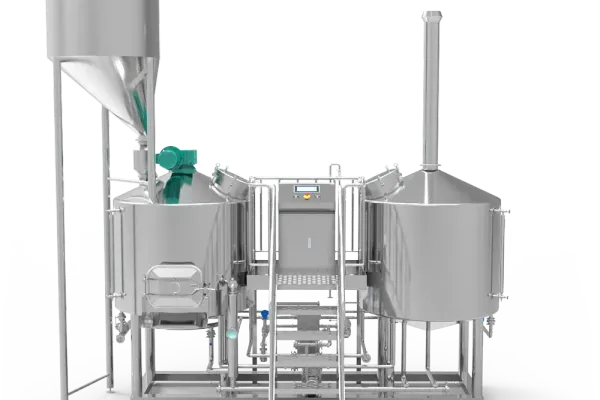
Why is Customization Crucial for Your Specific Mixing Tank Needs?
Sure, you can find standard, off-the-shelf tanques de mezcla. But let’s be honest – how often does a “standard” solution fit perfectly? Especially in specialized fields like craft brewing or unique food processing, your process has specific needs. That’s where customization comes in, and why it’s so important. As manufacturers who live and breathe custom stainless steel fabrication, particularly depósitos for the brewing and beverage industry, we know that tailoring a depósito to your specific application makes a world of difference. A custom tank isn’t just a luxury; it optimizes how you work, improves your product quality, and fits seamlessly into your production line. It’s about getting the exact depósito you need.
What can be customized on a tanque de mezcla? Lots!
- Size & Shape: Need a taller, skinnier depósito to fit a tight spot? Or a wider, shorter one? We can adjust dimensions.
- Ports, Ports, Ports: Where do you need connections? We can place the inlet, outlet, sample valves, sensor connections (like thermowells for temperature probes), and manways exactly where they make sense for your workflow and process inside the depósito. We commonly use sanitario Tri-Clamp ferrules for these ports.
- Bottom Shape: Need every last drop out? A cone bottom with a specific slope is great for that, especially for harvesting yeast in brewing or settling solids. Other options like dished or flat-sloped bottoms are available for different depósito uses. A cónico bottom is very popular.
- Agitator Setup: Got a specific mezcladora in mind? We design the depósito to support it properly, including motor mounts and internal baffles if needed.
- Jacket Zones: Need different temperature zones in one depósito? We can create multiple jacket sections for finer control de temperatura.
- Surface Finish: How smooth does the inside need to be? We offer different levels of polished finish for the interior and exterior, critical for sanitario needs or just for looks. A #4 brushed exterior and a 2B or polished interior are common for depósitos.
- Extras: Need a ladder or platform? Sight glasses to see inside? Spray balls for automated cleaning (CIP)? A special lid, like a hinged lid? Want the depósito insulated (insulate)? We can add all sorts of accessories.
Working with a manufacturer like us, who specializes in custom stainless steel fabrication, means your tanque de mezcla becomes a purpose-built tool, not just a generic container. This tailored configuración helps you make the best product possible, efficiently and safely. This level of detail for your depósito es clave.
Ensuring Sanitary Design: What Features Matter in Food and Beverage Tanks?
When you’re making something people will eat or drink, keeping things clean isn’t optional – it’s everything. In the food and beverage industry, including brewing, sanitario design for equipment like tanques de mezcla is critical for safety and quality. A depósito used for consumables must be designed to stop bacteria from growing and be super fácil de limpiar and sanitize effectively. As builders of tanks for food y bebida applications, including countless brewing depósitos, we focus heavily on sanitario design features.
What makes a tanque de mezcla truly sanitario?
- The Right Material: We use food-grade acero inoxidable, usually acero inoxidable 304. For products that are extra salty or acidic, we often recommend 316l stainless steel because it has even better corrosion resistance. 316L is a top choice for demanding sanitario depósitos.
- Smooth Inside: All the surfaces inside the depósito, especially the welds where pieces of metal join, must be ground completely smooth and often polished. Think mirror-smooth! This eliminates tiny cracks or pits where germs could hide. A high-quality polished finish es clave.
- Rounded Corners: Sharp corners inside a depósito are hard to clean. We design internal corners with gentle curves (radii) so cleaning solutions and brushes can reach everywhere.
- Drains Properly: The bottom of the depósito needs to slope towards the outlet port so everything drains out – no puddles left behind after emptying or cleaning. Cone bottom designs are excellent for this.
- Clean Connections: All the connection points (inlet, outlet, sensor ports) use special sanitario fittings, like Tri-Clamp connections. These are designed to be taken apart easily for cleaning and inspection, leaving no hidden areas in the depósito sistema.
- Perfect Welds: Welds need to be strong and smooth, without any gaps or holes. We often treat the welds chemically (passivation) to restore the steel’s full corrosion resistance around the weld area on the depósito.
- Ready for CIP: Many facilities use Clean-In-Place (CIP) systems. We design the depósito so CIP spray balls can be installed to spray cleaning solutions effectively over all internal surfaces.
Investing in a properly designed sanitary mixing tank using 304 o Acero inoxidable 316L is an investment in your product’s safety, your customers’ health, and your brand’s reputation. It makes cleaning faster and more reliable, significantly reducing contamination risks in your depósito. This is a core part of high-quality stainless steel mixing equipment.
Beyond the Tank: The Importance of Technical Support and Service?
Buying a big piece of equipment like a stainless steel mixing tank is just the first step. What happens after it arrives? Reliable soporte técnico and service make a huge difference. Imagine running into an issue during a critical production run – you need help, fast! As leading manufacturers with customers worldwide, we believe strong support is just as important as the depósito itself. It’s about partnership, not just a sale.
Why does ongoing support matter so much for your depósito?
- Setup Help: Getting a new depósito, especially a complex custom tank or one with an integrated mezcladora and controls, installed correctly is crucial. We can offer guidance or assistance with installation and commissioning to make sure everything works right from day one.
- Problem Solving: Things happen. If your agitador stops, or you suspect an issue with the jacket, quick troubleshooting support minimizes downtime and lost production. Having experts familiar with your specific depósito spec is invaluable.
- Maintenance Tips: We want your depósito to last a long time! We provide advice on preventative maintenance to keep your stainless steel mixing tank performing at its best for years.
- Spare Parts Access: Need a new gasket, seal, valve, or part for your mezcladora? Knowing you can easily get the right parts for your depósito keeps things running smoothly.
- Process Advice: Sometimes, you might wonder how to best use your depósito for a new recipe or specific food product. Our expertise can help you optimize your process, perhaps advising on mixing speeds or control de temperatura profiles.
Choosing a manufacturer who stands behind their depósitos with solid soporte técnico gives you confidence. It’s peace of mind knowing help is available if you need it, protecting your investment. This is especially true for Startup Craft Brewery Owners learning new equipment or experienced pros pushing production limits. Good support ensures the overall reliability of your tanque de mezcla system. Explore our range of Tanque de fermentación de acero inoxidable y tanques brillantes, all backed by our commitment to service.
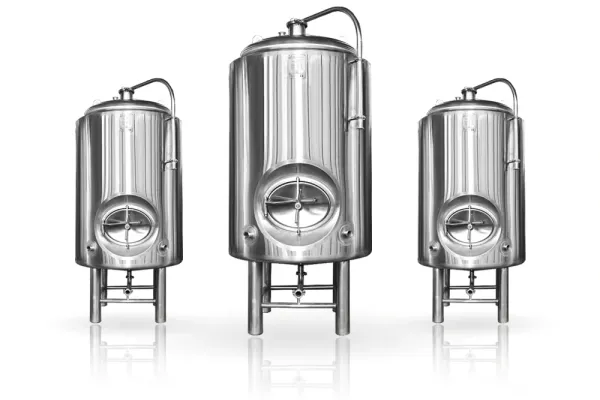
Are Used Stainless Steel Mixing Tanks a Viable Option?
Everyone loves saving money, so the idea of buying a used stainless steel mixing tank can be tempting. You might find listings under “used industrial equipment” or see an inventory of used depósitos online. While it can sometimes work out, especially for non-critical industrial applications, buying used carries significant risks, particularly if you need the depósito para sanitario purposes like food and beverage o pharmaceuticals. Careful consideration is needed before purchasing any used stainless steel mixing tanks.
What are the potential downsides of buying a used depósito?
- Hidden History: You often don’t know what the depósito was used for previously. Aggressive chemicals? Allergens? Residues could remain, or the steel itself might be compromised. Verifying the past use of a depósito is tough.
- Wear and Tear: Older depósitos can have invisible problems like metal fatigue, tiny cracks, or hidden corrosion (pitting). These could lead to leaks, failures, or contamination down the road. The durability might be compromised.
- Sanitation Issues: Scratches, dents, or bad repairs on the inside surface of the depósito can create tiny hiding spots for bacteria, making the depósito impossible to truly sanitize. Assessing the internal sanitario condition is vital but difficult.
- Wrong Fit: A used depósito was built for someone else’s needs. It’s unlikely to have the perfect gallon size, port locations, jacket type, or agitador mount for your process. Modifying a used depósito can be expensive and tricky.
- No Backup: Usado mixing tanks for sale almost always come “as is,” meaning no warranty and no manufacturer soporte técnico if something goes wrong with the depósito.
- Old Tech: En depósito design might be outdated and not meet current sanitario standards or efficiency expectations.
So, while a used depósito might be okay for simple mixing and storage of non-food materials, the risks for brewing, food processing, or pharma are usually too high. Investing in a new, alta calidad, potentially custom tank from a reputable manufacturer like us ensures you get a depósito that meets standards, is safe, built for durability, comes with a warranty, and includes access to support. Checking the spec carefully is crucial if considering used industrial mixing tanks.
How Do We, as Brewing Equipment Specialists, Ensure Your Mixing Tank Success?
Here’s the deal: we’re not just churning out metal depósitos. We are a Brewing Equipment Manufacturing plant passionate about helping our clients succeed. Whether you’re a Startup Craft Brewery Owner filled with dreams, an Experienced Brewmaster perfecting complex brews in a 1500L 3 Recipientes Equipo de Cervecería setup, a growing Brewpub Chain needing consistent quality, a creative Winery or Cider Producer, or a Beverage Entrepreneur exploring Tanque de fermentación de Kombucha options – we aim to be your partner. Our deep knowledge of the entire brewing process heavily influences how we design and build every stainless steel mixing tank.
Here’s how we ensure your tanque de mezcla is a success story:
- Top-Notch Materials: We start with certified acero inoxidable 304 y 316l stainless steel. No cutting corners. This guarantees the durability, corrosion resistancey sanitario qualities essential for any bebida or food depósito. We deliver high-quality stainless steel mixing depósitos.
- Made For You (Customization): We excel at custom stainless steel work. Need a specific gallon size to fit your batch? Unique port locations? A special agitador? A tricky jacket design for precise control de temperatura? We build your custom tank para su specific needs.
- Hygiene First (Sanitary Design): Every brewing and food processing depósito we make follows strict sanitario guidelines. Smooth welds, proper polished finish, easy draining – everything designed to keep your product pure and cleaning simple.
- Seeing the Big Picture (Integrated Solutions): We know your tanque de mezcla doesn’t exist in isolation. We design tanks and mixer packages and consider how they fit with your entire production line, from brewhouse to cellar, ensuring everything works together seamlessly. Our sistema de elaboración de cerveza automatizado designs consider every depósito.
- Support You Can Count On: From the first chat about your depósito needs, through design, installation, and for years after, our team provides expert soporte técnico. We’re here to help you get the most from your depósito investment. We proudly offer mixing tanks USA designed and supported, often made in the USA, meeting rigorous standards.
Our mission is simple: provide high-quality, customizable brewing equipment, focusing on the essential stainless steel mixing and storage tanks, that empower you to make amazing products. We want to build the perfect tanque de mezcla solution that helps your business thrive. Your success is our success. Let’s discuss the ideal depósito para ti.
Frequently Asked Questions (FAQs)
-
What’s the difference between 304 and 316L stainless steel for a mixing tank?
acero inoxidable 304 is the most common food-grade acero inoxidable para depósitos, offering great general corrosion resistance y durability. Acero inoxidable 316L includes molybdenum and has less carbon, giving it superior corrosion resistance, especially against salts (chlorides) and certain acids. 316L is often chosen for depósitos handling products with higher salt, more acidic ingredients (like some sauces or pickles), or in pharmaceutical applications needing maximum purity. The ‘L’ means low carbon, which is better for welding the depósito structure. -
How often should I clean my stainless steel mixing tank?
Para sanitario uses like food and beverage or pharma, the tanque de mezcla must be cleaned thoroughly after every single batch. This prevents any residue buildup or bacteria growth inside the depósito. The exact cleaning steps (time, temperature, chemicals for CIP) depend on what you’re mixing and industria rules. Consistent cleaning is key for keeping the depósito sanitario. -
Can I add a jacket to an existing single-wall tank?
While it might seem possible, adding a jacket to an existing single-wall depósito is usually very difficult, expensive, and risky. It involves complex welding on the depósito which can warp the metal or compromise its structure or sanitario state. It’s almost always better and more reliable to buy a new depósito specifically built as a jacketed tank if you need control de temperatura. -
What information do I need to provide to get a quote for a custom mixing tank?
To give you the best quote for a custom tank, we need details! Tell us the gallon size you need, what product(s) you’ll be mixing in the depósito (this helps with material choice and agitador design), if you need heating or cooling (so we can design the jacket), which acero inoxidable grade you prefer (304 o 316L), where you want the ports and manway on the depósito, the internal/external finish (polished finish?), any size limits for your space, and if you need special certifications like ASME. The more info about your specific application for the tanque de mezcla, the better! -
How long does a high-quality stainless steel mixing tank typically last?
A well-made high-quality stainless steel mixing tank (SS 304 o 316L) can easily last 20, 30, or even more years with proper care. Stainless steel’s natural durability y corrosion resistance give these depósitos a very long life. How long su depósito lasts depends on what you mix in it, how often you use it, your cleaning routine, and regular maintenance. Buying a good depósito is a solid long-term investment. -
What type of agitator is best for brewing?
The “best” agitador for a brewing depósito depends on which depósito you mean! Mash/lauter tuns often use slow-moving rakes or simple paddles. Brew kettles might have an agitador to prevent sticking and help boil dynamics/hop usage. Whirlpool depósitos usually rely on a tangential inlet port to create the spin, but sometimes use a specific mezcladora. Fermenters typically don’t need constant agitación, but some brewers use gentle mixing for specific yeast handling. We help brewers choose the right agitador for each specific depósito in their Sistema de fabricación de cerveza en pequeños lotes de 500 litros or larger setup.
Principales conclusiones:
- Acero inoxidable (304/316L) is the top choice for tanques de mezcla due to durability, corrosion resistance, and being sanitario.
- Depósito designs are adapted for different industries (brewing, food, pharma) and specific mixing and storage tank applications.
- The correct agitador/mezcladora type is vital for effective mixing in the depósito, depending on the liquid and process goal.
- Tanques con camisa provide essential control de temperatura (heating or cooling) for many processes via the jacket.
- Elija depósito gallon capacity (30 gallon, 100 gallon, etc.) based on batch size, space, and future plans.
- Personalización lets you get the perfect custom tank configuración (ports, bottom, jacket) for your needs.
- Sanitarios design (polished finish, smooth welds) is critical for tanks for food, bebida, and pharma.
- Look for manufacturers offering strong soporte técnico beyond the initial depósito purchase.
- New, alta calidad depósitos are generally safer and more reliable than used stainless steel mixing tanks for critical applications. Check out our CUBAS DE MEZCLA page for options.
- As Brewing Equipment Manufacturers, we provide high-quality, customizable stainless steel mixing tanks with expert support.
Ready to upgrade your process with a stainless steel mixing tank designed for excellence? Contact us today to discuss your unique requirements. Let our team design the ideal mixing and storage tank solution for your facility. Let’s build better beverages together, starting with the perfect depósito. Solicitar presupuesto now!



